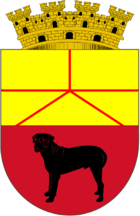Prime Minister of Austenasia
| Prime Minister of the Empire of Austenasia | |
|---|---|
 Logo of the Prime Minister's Office | |
| Style | The Right Honourable |
| Member of | Cabinet Parliament |
| Term length | Four years |
| Inaugural holder | HIH Crown Prince Jonathan |
| Formation | 20 September 2008 |
| Deputy | Deputy Prime Minister |
The Prime Minister of Austenasia is the head of government of the Empire of Austenasia. The Prime Minister is elected by the subjects of Austenasia in a General Election, to ordinarily be held every four years, the precise date of which to be specified by the Monarch. Representatives wishing to stand for election must first be made Candidates by the Monarch. Although there is no hard limit on serving consecutive terms, a Prime Minister who has served more than seven of the past eight years in office cannot stand for re-election without a vote of approval from the House of Representatives.
The founding Prime Minister of Austenasia was HIH Crown Prince Jonathan. The Crown Prince was re-elected in General Elections in January 2009 and December 2011, but was replaced with his deputy Lord Marshal William as Acting Prime Minister in January 2013 when he became Monarch as Emperor Jonathan I. Four more Prime Ministers have held office since, including Lord John Gordon, who was elected to a second non-consecutive term in February 2024. The incumbent is Lord Andrew Creed after he won the General Election on 24 September 2024.
Constitutional role
Under the Constitution, the Monarch may not be Prime Minister; this law is to ensure that no person has absolute power within the Empire. Although the Monarch can become a Representative (Jonathan I has for almost all of his reign been Representative of Wrythe), they cannot therefore make themselves a Candidate. If the Prime Minister inherits the Throne, they must either refuse it or stand down and make the Deputy Prime Minister the Acting Prime Minister. This led to the ascension of Esmond III to the Throne when Crown Prince Jonathan refused to stand down as Prime Minister after the abdication of Terry I.
The main role of the Prime Minister is to oversee the activities of the Cabinet and co-ordinate the work of its ministers, and to act as the voice and public face of the elected Austenasian government. The Prime Minister holds several other powers, including the deciding vote in the case of a tie by the House of Representatives. The Prime Minister is also one of the two choices for Regent should the Monarch be a minor or incapacitated.
The Prime Minister is constitutionally barred from being a member of the Austenasian Senate. However, the Prime Minister nominates a member of the Senate, who serves as a Senator at their discretion.
Under the Austenasian Constitution of 2008, the Prime Minister was considered by far the most powerful position in Austenasia. However, from mid-2010 the position started to become more equal in power with that of the Monarch, and since the enactment of the Austenasian Constitution of 2011, the Monarch has been indisputably more powerful. The role and powers of the Prime Minister did not significantly change (although they were more precisely defined) over 2009-11, but this subordination to the Throne was instead the result of an increased influence of the Monarch over Austenasian politics.
List of Prime Ministers
| # | Portrait | Name Honorifics and City or Town |
Term of office — Electoral mandates |
Other offices held | Party | Deputy | Monarch | |
|---|---|---|---|---|---|---|---|---|
| 1 | 
|
His Imperial Highness Crown Prince Jonathan Representative of Wrythe |
20 September 2008 |
20 January 2013 |
Theodorist Party (from 2012) | Lord Marshal William | Terry I Esmond III Declan I | |
| 2009, 2011 | ||||||||
| Founder of Austenasia, declared Prime Minister in the Declaration of Independence; later elected in 2009 and 2011. Presented Glencrannog to the Empire and oversaw the annexation of South Kilttown, adding another Representative to the Cabinet. Defended Wrythe during the Skirmish of the Treasury and personally conquered Commius Flats. Held office during the Terry I abdication crisis, and refused to inherit the Throne so as to remain Prime Minister. Held office during the Austenasian Civil War and organised the Austenasian Monarchical Referendum. Held office during the War of the Orlian Reunification. Organised the Austenasian Constitutional Referendum and held office during the enactment of the Austenasian Constitution of 2011. Unveiled Theodorism in January 2012 as a theoretical model of ideal governance for the Empire, but made no attempt to implement it. Held office during the acquisition and loss of several protectorates, and represented the Empire at the 2012 Polination Conference. Stood down as Prime Minister upon inheriting the Throne after the abdication of Declan I. | ||||||||
| - | 
|
Lord Marshal William Baron of Zephyria Representative of Zephyria Acting |
20 January 2013 |
18 November 2013 |
Independent (considered militarist) | None | Jonathan I | |
| None | ||||||||
| Became Acting Prime Minister upon the ascension to the Throne of Jonathan I. Proposed no new policies and took on little executive leadership in the face of the more proactive role of the Throne as held by Jonathan I. Acted mostly as a "rubber stamp", supporting the Emperor's decisions on matters. | ||||||||
| 2 | 
|
Her Imperial Highness Eritoshi Countess of Memphis Representative of Thanasia |
19 November 2013 |
3 March 2015 |
Green Party | Lord John Gordon | ||
| 2013 | ||||||||
| Elected Prime Minister in the November 2013 General Election. Developed the role of the premiership under Lord Marshal William by functioning as an "enforcer" for the Emperor's policies, using the Prime Ministerial deciding vote and the prestige of her office to have legislation proposed by the Emperor passed more easily through Parliament. Established the Green Party of Austenasia to organize her supporters and release her electoral platform. Lost the 2015 general election. | ||||||||
| 3 | 
|
Her Imperial Highness Lady Admiral Vera Hewitt Duchess of New Virginia Representative of New Richmond |
4 March 2015 |
12 February 2020 |
Imperial Party | (1) Countess Eritoshi of Memphis (2) Lady Vice Admiral Elizabeth Lewis | ||
| 2015, 2019 | ||||||||
| Elected Prime Minister in the 2015 general election, defeating the incumbent Countess Eritoshi. Longest term of any Prime Minister to date. Oversaw the return of the Prime Minister to being an active head of government. Codified the Prime Ministerial nomination of Cabinet ministers. Oversaw the re-establishment of the Imperial Navy. Established the Ministry for Culture and reformed the functions of the Treasury. Reformed military command and rank structures. Oversaw the annexation of various areas. Assisted Emperor Jonathan I in re-establishing the Grand Unified Micronational. Dissolved the Environmental Office. Presented legislation creating the status of City for highly-populated towns and the Capital, Wrythe. Oversaw the dissolution of the Towns of Zephyria, Thanasia and Porthbokon. Re-elected in the 2019 general election, but left office the following year due to the secession of New Virginia. | ||||||||
| 4 | 
|
His Serene Highness Prince Dionisiy I Duke of Lycaonia Representative of Theodosiopolis |
13 February 2020 |
1 June 2020 |
Fatherland Party (until May 2020) | (1) Lord Edward Gunderson, Count of New Grémmia (2) Lord John Gordon, Viscount of Thetford | ||
| 2020 | ||||||||
| Elected Prime Minister in the 2020 general election on a platform of constitutional reform with a 12% difference. Opposition to these proposed reforms from within Parliament led to a political crisis solved only by the assumption of emergency powers by Jonathan I, and ultimately led to Prince Dionisiy resigning as Prime Minister and leaving Austenasia along with various administrative divisions he had claimed for the Empire. Shortest term of any Prime Minister to date. | ||||||||
| 5 | 
|
Lord John Gordon Viscount of Thetford Representative of Palasia |
1 June 2020 |
17 September 2021 |
Independent (until 16 August 2021) | Lord William Wilson, Count of Oribrazos | ||
| None | ||||||||
| Directly appointed to the position under the provisions of the emergency powers assumed by Jonathan I upon the resignation of Prince Dionisiy, having been appointed his Deputy and successor. Was confirmed by Parliament in a vote of Confidence on 21 June 2020. Restored political stability and oversaw the growth of the nation to a record-breaking size. Did not serve a full term, but stepped down as Prime Minister the following year to allow for a properly elected successor. | ||||||||
| 6 | 
|
Lord William Wilson Duke of Taysha Representative of Nahona |
18 September 2021 |
12 February 2024 |
Arete Party | (1) Lord Hunter Prater, Duke of Dixie (2) Bradley, King of the Romans | ||
| 2021 | ||||||||
| Elected in September 2021 with 76.6% of the vote after campaigning to increase the activity of and public accessibility to the government, and to promote Austenasian art and culture. Oversaw a naturalisation program culminating in a mass grant of subjectship to applicant non-residents in May 2023, as well as the subsequent creation of the Austenasian Divisions to enable parliamentary representation for non-residential subjects | ||||||||
| 7 | 
|
Lord John Gordon Viscount of Thetford Representative of Palasia |
13 February 2024 |
22 July 2024 |
-None in Cabinet
|
Arete Party | Lord Andrew, Baron of Corinium Terentium | |
| February 2024 | Prince Regent Aggelos (Jonathan I as nominal Emperor) | |||||||
| Elected with 60.6% of the vote. The first Prime Minister to serve a second non-consecutive term. Oversaw the regency of Jonathan I. | ||||||||
| 8 | 
|
Lord Andrew Creed Baron of Corinium Terentium Representative of the Britain and Ireland Division |
22 July 2024 |
Incumbent | Independent | (1) Shiro Mephistopheles Acting (2) Lord John Gordon | ||
| September 2024 | Aggelos I | |||||||
| Became Acting Prime Minister - as the incumbent Deputy - upon the resignation of Lord John Gordon. Won General Election on 24 September 2024 with 75.75% of the vote. Oversaw Austenasia's withdrawal from the GUM. | ||||||||
